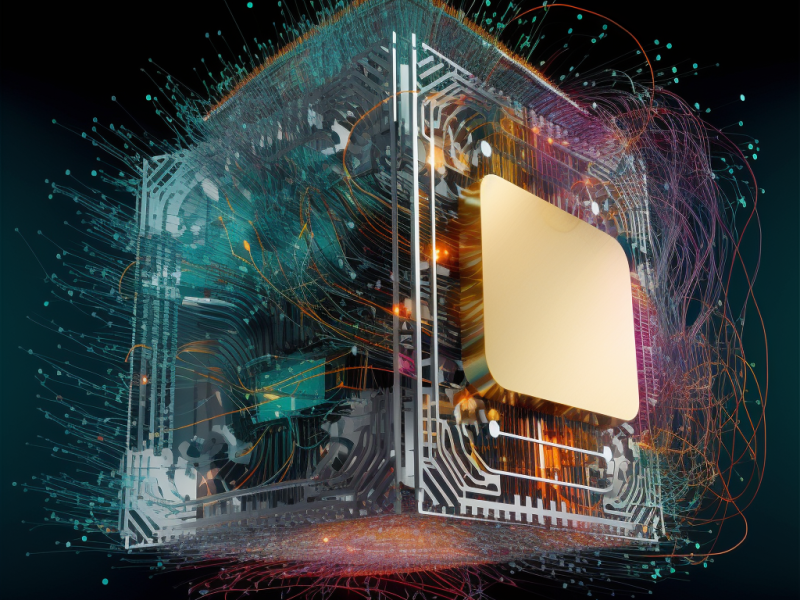Quantum computing and data science are converging to create a paradigm shift in data analysis. This synergy promises to overcome traditional computing limitations, offering groundbreaking ways to process and analyze vast datasets.
The Quantum Leap in Data Analysis
Quantum computing introduces qubits, which, through states of superposition and entanglement, allow for processing data at unprecedented speeds. This represents a significant leap from binary bits, enabling simultaneous computation paths and solving complex problems quickly.
In the realm of computing, quantum mechanics has introduced a groundbreaking technology known as quantum computing. Unlike classical computers, which use bits to process information in a binary fashion representing either a 0 or a 1, quantum computers operate using quantum bits, or qubits. These qubits have the extraordinary ability to exist in a state of superposition, meaning they can represent both 0 and 1 simultaneously. This capability allows quantum computers to perform many calculations at once, dramatically increasing their computational power.
Furthermore, qubits exhibit a property known as entanglement, which Einstein famously referred to as “spooky action at a distance.” When qubits become entangled, the state of one qubit can instantaneously affect the state of another, regardless of the distance separating them. This phenomenon enables quantum computers to execute complex algorithms with remarkable efficiency. The implications of quantum computing for data analysis are profound. With the ability to perform multiple calculations concurrently and solve problems exponentially faster than traditional computers, quantum computing stands to revolutionize fields such as cryptography, materials science, and drug discovery. For data scientists, quantum computing offers a tantalizing glimpse into a future where the analysis of massive datasets could be accomplished in mere moments, revealing insights that could drive innovation and discovery at an unprecedented pace. The intersection of quantum computing and data science is poised to push the boundaries of what is computationally possible, transforming data analysis into a more powerful and dynamic tool for exploration and problem-solving across diverse sectors.
Data Science’s New Horizon
Data science, which traditionally grapples with the challenges of extracting meaningful information from large and complex datasets, is on the cusp of a transformation thanks to quantum computing. The sheer volume of data generated in the modern world is staggering, and conventional computational methods are increasingly falling short when it comes to processing and analyzing this information effectively and efficiently.
Quantum computing promises to address these challenges head-on. With quantum computers, data scientists will have at their disposal tools that are orders of magnitude more powerful than anything available today. The ability to perform complex calculations and model intricate systems that are currently beyond the reach of classical computers could greatly enhance the predictive power of algorithms and the precision of data analysis. The potential applications are vast and varied. In the field of genomics, for example, quantum computing could enable the analysis of genetic data at a level of detail and speed that could revolutionize personalized medicine. In finance, quantum algorithms might detect market patterns and risks that are invisible to current models, leading to more robust financial strategies.
This new horizon in data science, enabled by quantum computing, is not without its challenges. The development of quantum algorithms that can fully leverage the potential of qubits, the creation of stable quantum computing environments, and the integration of quantum processors with existing data infrastructures are significant hurdles that must be overcome. However, as these challenges are addressed, the impact on data science—and the knowledge it generates—will be transformative, driving forward a new era of discovery and innovation.
The Synergy of Quantum Computing and Data Science
The synergy between quantum computing and data science is a burgeoning field with the potential to redefine the entire landscape of computational analytics. When the principles of quantum mechanics are applied to the realm of data analysis, the result is a powerful combination capable of tackling some of the most complex and computationally intensive problems faced by researchers and industry professionals alike. Quantum computing’s ability to process vast arrays of data simultaneously through superposition and to perform coordinated operations via entanglement means that it can uncover correlations and patterns in datasets that are simply too large or too complex for classical computers to handle. This could dramatically shorten the time required for data processing tasks that currently take days or weeks to complete, down to just minutes or even seconds.
Data science, which encompasses a variety of statistical, machine learning, and analytical techniques used to interpret and manipulate large datasets, stands to gain immensely from such capabilities. Quantum algorithms are being developed that can optimize machine learning models, providing a level of precision and speed that could greatly enhance the accuracy of predictions and the efficiency of data-driven decision-making processes.
The synergy of these two fields has the potential to foster new approaches to longstanding problems, such as optimizing logistics, simulating complex chemical reactions for drug development, and modeling climate change impacts with greater accuracy. The integration of quantum computing into data science workflows could also lead to the development of new types of services and technologies, extending the boundaries of what is currently achievable. As the technology matures and more quantum-computing resources become available, we can expect a significant acceleration in the pace of research and innovation. The collaboration between quantum computing experts and data scientists will be critical in translating the theoretical advantages of quantum computing into practical, real-world applications that can benefit society as a whole.
Quantum computing and data science are ushering in a new era of data analysis. The combination of these two fields can lead to significant advancements in how we process and interpret complex datasets, potentially transforming numerous industries.
Our team of experts is ready to provide you with tailored solutions and support to ensure you harness the full power of quantum computing and data science for your analytical needs. Contact us now.

